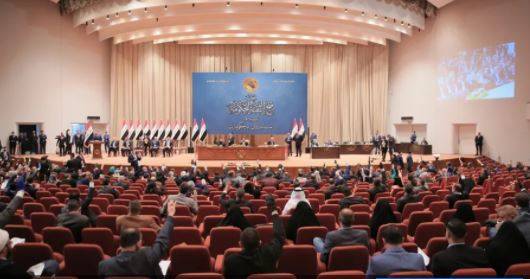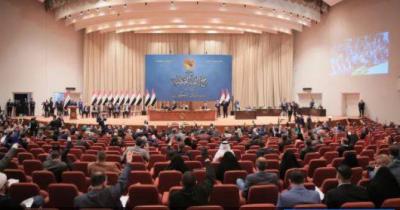Iraqi political forces aligned with the "Coordination Framework" have launched a wide campaign to influence the "triple alliance" formed between the leader of the Sadrist movement, Muqtada al-Sadr, the Speaker of Parliament, Mohammad al-Halbousi, and the leader of the Kurdish Democratic Party, Masoud Barzani. This agreement among the parties led to an agreement on the presidency of the Parliament, which is held by Sunni blocs, with al-Halbousi assuming the position in a session held last week, amid expectations of potentially passing the presidency and prime minister positions in the same manner, with figures close or affiliated with those alliances.
However, the Coordination Framework forces, (a political assembly of armed militia political wings), have launched a broad campaign to dismantle this alliance by sending the head of the Fatah Alliance, Hadi al-Amiri, to meet with al-Sadr in Najaf, to persuade him to abandon the idea of a "majority government" and the necessity of including all political forces in the next government, which al-Sadr rejected. Al-Sadr tweeted after meeting with al-Amiri: "No eastern nor western, a national majority government," confirming that the two sides had not reached any solutions regarding the possibility of forming a single alliance.
Following this, al-Amiri headed to the Kurdistan Region, where he met with Kurdish leaders, including Masoud Barzani and Prime Minister Masrour Barzani, discussing the government formation file. According to leaks from the meeting, Barzani took a firm stance against al-Amiri's attempts to sway or influence his alliance with al-Sadr.
This political movement by al-Amiri came after a series of events in Baghdad against the political parties involved in the "triple agreement," such as the Progress Alliance, as well as the offices of the Kurdish Democratic Party, which observers viewed as an attempt by the Coordination Framework forces to dismantle the "triple alliance" through either grassroots or political activity.
In this context, the director of the Iraqi Media Center in Washington, Nizar Haidar, stated that "some forces in the Coordination Framework tried to dismantle the ties of this alliance by all means, to the point that some of them employed force, weapons, and intimidation to achieve that, but all of them failed, which is very natural, as this election produced a significant gap between the biggest winner, the Sadrist movement, and the biggest loser, the State of Law."
Haidar added in a statement to "Sky News Arabia" that "al-Amiri's visit to Erbil is likely to benefit the triple alliance, after the framework lost hope in dismantling its ties, especially since it comes right after his visit to Najaf." He pointed out that "the Sadrist movement is of one color, one leadership, one vision, and one will, whereas the framework is varied and contradictory in everything."
Observers believe that this new political bloc will create an opportunity to make a new political decision in Iraq in the upcoming phase, and if it remains united, it can choose the remaining presidencies and resolve all positions in the ministerial formation and high state offices.
Last week, the Iraqi Parliament managed to renew its former Speaker, Mohammad al-Halbousi, in a session that witnessed chaos and shouting among deputies, as well as the withdrawal of parliamentarians from the Coordination Framework forces. Al-Sadr still insists on keeping armed forces out of the next government and refuses to ally with them, repeatedly conditioning their detachment from political decisions and the necessity of legal framing of their status before engaging with them, having managed to generate local Iraqi public opinion on the matter.
However, the political forces in the "Coordination Framework" reject al-Sadr's propositions, viewing them as excluding an "important" party from the upcoming government, which they consider marginalization and exclusion from decision-making. For several days, these groups have been trying to create a rift in the political process through their movements, but have not succeeded so far, prompting a visit from the commander of the Quds Force in the Iranian Revolutionary Guard, Ismail Qaani, to al-Sadr, who rejected all of his offers.




